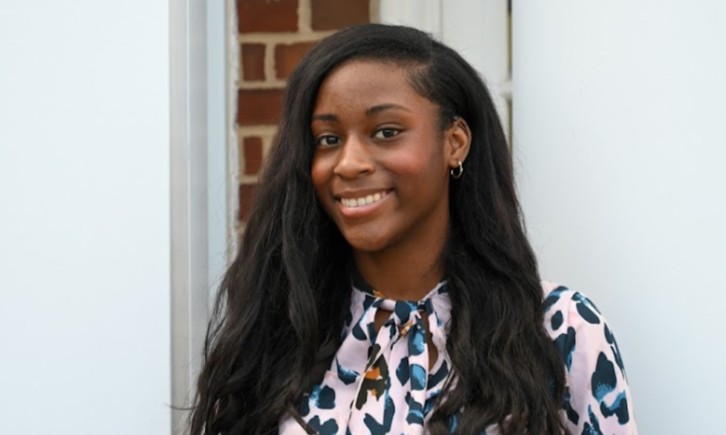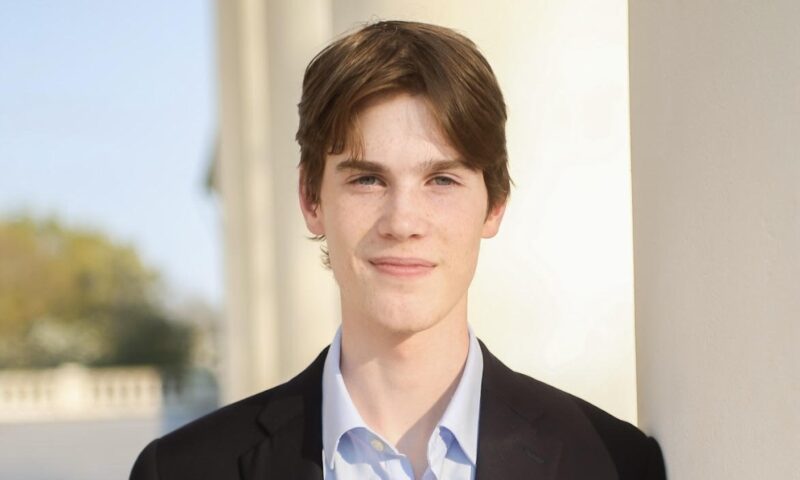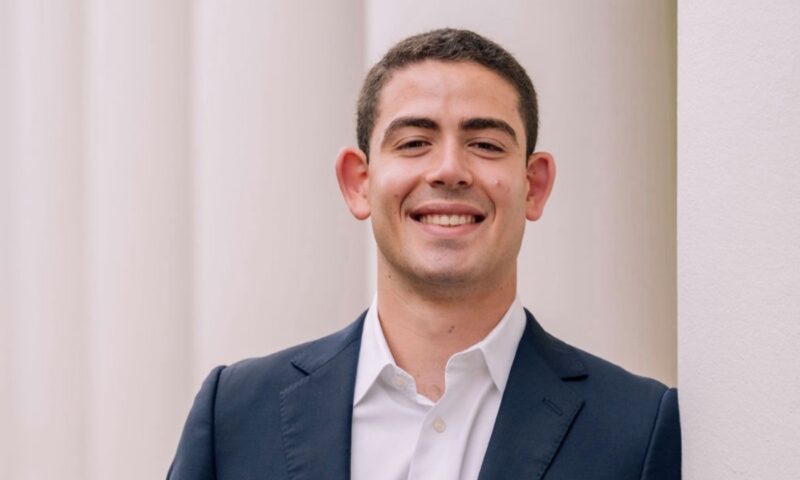If you want to see how commerce can empower people and allow them to advance what is most important to them, look no further than Sarrah Abdulali.
A soon-to-be Business Analyst at McKinsey in Atlanta, GA, Abdulali has come to commerce as a natural progression stemming from many influences that have shaped her identity: an entrepreneurial mother selling homemade traditional dishes, the tight-knit Shia Islam communities that she has been raised in, the students she’s met at UVA, and from an early age, an expressive motivation to create designs in the ancient art of henna tattooing.
But perhaps because her culture is central to her being, she sees commerce as a conduit to both support and expand on its role in her life.
Starting with her first name, a traditional one that she admits often gets confused for the more widespread “Sarah,” she decided to use it when she came to Grounds, as it speaks to her background and connection to community.
“My name means a lot to me,” she says, “more so because my father was an orphan, and his real mother’s name was Sarrah.” (It is pronounced closer to how English speakers might say “Zara.”) She explains that the leader of her Shia Islam sect (Dawoodi Bohras) provides names to week-old newborn children, and her father specifically requested hers. “I thought I’d give it some more respect,” she says in reverence to the strict Islam upbringing that she has observed her entire life. “The community is super small, but we’re all very interconnected, and there’s only one or two of us at UVA, so that helps put things in perspective, too.”
An active part of many communities at the University, Abdulali has been an engaged participant in her education from early on in her life, and as she approaches the end of her undergraduate studies, she has many plans to maintain that strength of cultural identity, intent to build community and use commerce to support what has been a lifelong self-starting approach to solving problems and expressing herself.
A Shared Responsibility
Raised in Stockbridge, GA, before moving to Tampa, FL, where she attended high school, Abdulali, says that despite having what she calls “a very humble upbringing,” a big part of it was being surrounded by a lot of food.
“Our fridge was always full, and the table always had fresh fruits,” the first-generation college student recalls. “This is a result of the Faiz-al-Mawaid al-Burhaniyah program that we have within the community: Basically, every week, a family is assigned to cook something for the rest of the community. Sometimes, during significant events, there are higher-caliber dishes, and sometimes, our upper leader actually tells people what to make, but it’s all rooted in making sure that everyone’s fed. That really drove me to appreciate having food on the table—and also knowing that one day I’m going to be paying that forward because my mom cooks and caters a lot for the mosque, too.”
She points out that her mother is also part of the thriving South Asian small business community, an entrepreneur who has been selling rotis (a type of flatbread) for more than 25 years. “She’s had consistent customers because of her ability to solve problems, her customer service, and her complimentary delivery—all the stuff that I learned in the prerequisites for Commerce comes into play through the entrepreneurs I’ve seen around me. My mom was the starting point,” she says, crediting her mother for generating her interest in business.
Abdulali learned the importance of contributing financially to her family and advancing her own goals when she started middle school and hoped to join symphonic band with her friends. When it came time to choose her instrument, her music teacher Katherine Crozier, a professional flutist, was motivated by intuition and suggested Abdulali try her hand at her instrument of choice.
 “She had me try out the flute because she just had a feeling, and, of course, I was a natural flute player,” she says. But then Abdulali faced the realities of the financial burden her household would incur if she attempted to take on a $500 rental for the school year. She was conflicted yet took it upon herself to inform her teacher that she would be forced to drop the class, as the investment cost of being in band was prohibitive.
“She had me try out the flute because she just had a feeling, and, of course, I was a natural flute player,” she says. But then Abdulali faced the realities of the financial burden her household would incur if she attempted to take on a $500 rental for the school year. She was conflicted yet took it upon herself to inform her teacher that she would be forced to drop the class, as the investment cost of being in band was prohibitive.
“I was very in tune with the conditions I was in and the circumstances surrounding my family, because I’m the oldest and only daughter,” she says, explaining she had four younger brothers at home. “My parents were already facing bills from so many other places that it just didn’t make sense. Because of being oldest, taking initiative, setting a good example for my brothers, and being realistic with what I could do is what drove me to tell her—and she made me feel so comfortable in class.”
When she broke the news that she would have to bow out of the school band, Crozier asked her to return to her classroom after school. Later that day, she presented Abdulali with an old childhood flute of her own. “She said, ‘If you get it repaired, it’s all yours.’”
She would go on to play regularly for nine years with the very same flute bearing her teacher’s initials, KC, engraved in the instrument. It’s currently stored in her closet at UVA.
How Abdulali afforded the $40 to get it fixed is another story.
Designing Small Business
The money for the flute repair came from henna. The temporary skin dye that comes from powdered leaves of the tree of the same name has been used to create intricate body art for centuries, but Abdulali began practicing designs on a small mirror with henna when she was five.
“I just had an urge in me to, not just to paint or sketch, but to do something more,” she says, recounting how she would take a less beloved henna cone from her mother’s room, working on the mirror. As she got better results over time, she branched out—to her brothers. “They were just sitting there watching TV, and I practiced on places that aren’t visible like their legs or their back. I kept at it until I exhausted everyone around me and I could start again a week later after it faded. That led to me think about how my family was struggling; I was getting older and [trying to determine what skills] I could capitalize upon, and so I started doing henna for people at the mosque,” she says. While she didn’t earn much, she did receive a fair amount of tips for her work.
“I would get maybe five bucks here and there, and that accumulated to $40, which was a big deal for me,” she says, detailing how she paid to fix the flute.
A few years later and a month before high school, when she and her family moved from Georgia to Florida, Abdulali had to start growing her clientele from scratch, which she accomplished by offering free services to people in order to take photos of her handiwork and build her portfolio on Instagram; her account currently showcases more than a hundred of her designs. “I’m proud that I took it upon myself to build that, because that is the single best resource for any small business to have: a portfolio of work.” As she became more involved in her Tampa community, she offered her talents to nearby Arab, Ethiopian, and Hindu communities, and gained customers by old-fashioned word-of-mouth, working five-hour shifts at big events. To show her commitment to doing henna for good, she even did 12-hour henna shifts overnight for Relay for Life to support cancer research.
In addition to holding down two math tutoring jobs, she continued doing henna art for people whenever she could.
Today, at UVA, she says she occasionally gets requests from interested students, but doesn’t often do large events unless she’s asked by clubs like the Indian Student Association, Pakistani Student Association, or Hindu Students Council. “I do it on myself whenever I can because it started from this passion that I had for it, and not because of the need for money, really,” she says. Yet in the years ahead, she hopes to take that enthusiasm for the art as the basis for a small business. “I want to make kits, make my own henna, make sure I can get the perfect formula for a good stain that lasts a long time, so it’s really consistent. I want to get the formula right, then sell my own kits, maybe even have templates for my designs and hopefully trademark my designs, if that’s even possible. That’s the goal down the line, but that’s something for when I have time after working,” says the Atlanta-bound future Business Analyst.
A Path in Commerce Found
 Abdulali found her way to UVA through first-gen, low-income student scholarship nonprofit QuestBridge, which paired her with the University in December of her senior year of high school. “It’s so true when they say you’re choosing the school as much as they choose you, because UVA read my application, could decipher who I am as a person, and knew I would fit in. So when I got to UVA, there really was no struggle with finding that community,” she says. Immediately, she joined the Indian Student Association (“I was affiliated more with my Indian identity than my Pakistani identity, because I’m half Indian, and I just got to know more people”), which provided her with a connection to some of the best friends she has made on Grounds. Once at the University, she also quickly found two other members of her religious sect, who in turn, introduced her to a larger community in Northern Virginia.
Abdulali found her way to UVA through first-gen, low-income student scholarship nonprofit QuestBridge, which paired her with the University in December of her senior year of high school. “It’s so true when they say you’re choosing the school as much as they choose you, because UVA read my application, could decipher who I am as a person, and knew I would fit in. So when I got to UVA, there really was no struggle with finding that community,” she says. Immediately, she joined the Indian Student Association (“I was affiliated more with my Indian identity than my Pakistani identity, because I’m half Indian, and I just got to know more people”), which provided her with a connection to some of the best friends she has made on Grounds. Once at the University, she also quickly found two other members of her religious sect, who in turn, introduced her to a larger community in Northern Virginia.
On the academic side, she had applied to UVA as a Math major, with her tutoring work and advanced Math courses in high school under her belt. But it wouldn’t stick. “I switched majors maybe four or five times—Math, Global Public Health, South Asian Studies, Economics.”
Eventually, she began attending Commerce-hosted events for first- and second-year students, and even participated in a virtual women’s series for first-years interested in McIntire. “That’s how I got my name across to certain individuals at McIntire,” she says, noting that she was encouraged to “take the risk and apply.”
Being accepted into McIntire allowed her to explore what she says is her “passion for commerce, like ‘Commerce for the Common Good,’ which is rooted from that community and through students around me, the narratives of people I’ve met, both growing up and at UVA,” Abdulali says, noting that she has been inspired by young UVA alumni she has connected and interacted with on social media and other Shia Islam students at other universities doing henna.

“It’s become like a common thread for me, and that has translated into studying Management and IT,” she says, unsure why she was drawn to Information Technology but felt compelled to concentrate in Management. “It takes a lot to look after a small business, to keep up your personal brand, and I’ve been learning things that are super valuable—like being a strategic leader,” she says. “I’m taking Strategic Leadership and already seeing so many good kind of frameworks for how I can use that to build my value proposition in my business, and continue to grow. But what really drives me is Commerce for the Common Good: making sure that people are being provided a good service and making sure that people are fed. It comes down to that community aspect and ensuring that I can build a community.”
While she hopes one day to apply for an MBA program through QuestBridge’s sponsorship program and take on a role in product management at a tech firm “down the line,” she says that McIntire has had an outsized role in her personal development. “I could name drop so many professors who have helped me get here,” she says, noting the work she’s put in as a manager at UVA’s fundraising center, Cavalier Connect, and in a Career Peer Educator (CPE) position at the UVA Career Center.
She’s somewhat surprised that time as an undergraduate at UVA has flown by as fast as it has. Abdulali wants future students to be aware of making the most of the opportunities at the University and to take advantage of the resources available to them. “I’ve never felt like I was going hungry; like through the Commerce food pantry and the Newcomb food pantry, I don’t feel scared to admit at some point that I relied on it, but now I am in a good spot financially because of the jobs I work at UVA and because of the aid that I get,” she says. “I can pass that information along to other students, and that has sparked conversation as well. I have immense gratitude for every year that I’ve had at UVA, and as I look to the future, I can’t help but feel a deep connection that I know will bring me back here, in one way or another. I’m excited for the day our paths cross again.”



